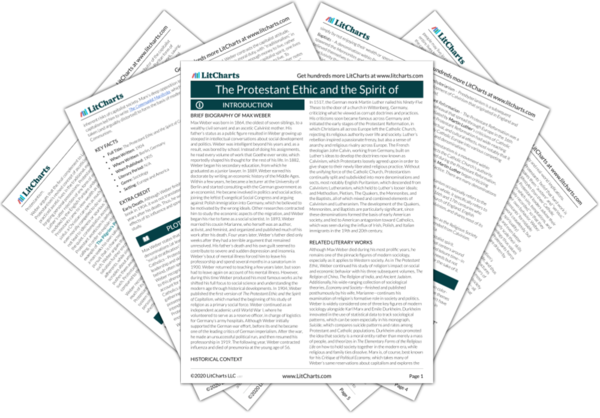Protestantism Quotes in The Protestant Ethic and the Spirit of Capitalism
Part 1, Section 1 Quotes
Business leaders and owners of capital, as well as the skilled higher strata of the labor force, and especially the higher technical or commercially trained staff of modern enterprises tend to be predominantly Protestant.
“The Catholic…is more calm; his acquisitive drive is lower, he places more value on a life which is as secure as possible, even if this should be on a smaller income, than on a perilous, exciting life, which could bring honor and riches.”
Part 1, Section 2 Quotes
A way of thinking like that of Benjamin Franklin was applauded by an entire nation. But in ancient medieval times it would have been denounced as an expression of the most filthy avarice and of an absolutely contemptible attitude.
The kind of people who are inspired by the “capitalist spirit” today tend to be, if not exactly hostile to the Church, then at least indifferent. The prospect of “holy tedium” of paradise holds few attractions for their active nature; for them, religion is simply something that stops people from working here on earth.
Part 1, Section 3 Quotes
The monastic style of life is now not only completely worthless as a means of justification before God (that much is self-evident), [Luther] also sees it as a manifestation unloving egoism and an abdication from secular duties. In contrast, labor in a secular calling appears as the outward expression of Christian charity.
The salvation of souls and this alone is at the heart of [Protestants’] life and work. Their ethical goals and the practical effects of their teaching are all anchored firmly here and are the consequences of purely religious motives. And we shall therefore have to be prepared for the cultural effects of the Reformation to be in large measure […] unforeseen and unwished for.
Part 2, Section 1 Quotes
Lutheranism, as a result of its doctrine of grace, simply failed to provide the psychological drive to be systematic in the conduct of life, and thus to enforce the rationalization of life.
This ascetic style of life, however, as we have seen, meant a rational shaping of one’s whole existence in obedience to God’s will. And this asceticism was no longer [merely good], but could be expected of everyone wanting to be sure of salvation. This rationalization of the conduct of life in the world with a view to the beyond is the idea of calling characteristic of ascetic Protestantism.
Now [asceticism] would enter the market place of life, slamming the doors on the monastery behind it, and set about permeating precisely this secular everyday life with its methodical approach, turning it toward a rational life in the world, but neither of this world nor for it.
Part 2, Section 2 Quotes
To want to be poor, it was often argued, was the same as wanting to be ill; it was to be condemned as seeking justification [salvation] by works, detrimental to the glory of God. Most of all, begging by one who is capable of work is not only sinful sloth, but is also […] contrary to charity.
If we may sum up what has been said so far, then, innerworldly Protestant asceticism works with all it force against the uninhibited enjoyment of possessions; it discourages consumption, especially the consumption of luxuries. Conversely, it has the effect of liberating the acquisition of wealth from the inhibitions of traditionalist ethics; it breaks the fetters on the striving for gain by not only legalizing it, but […] seeing it as directly willed by God.
As asceticism began to change the world and endeavored to exercise its influence over it, the outward goods of this world gained increasing and finally inescapable power over men, as never before in history.
It might truly be said of the “last men” in this [capitalist] cultural development: “specialists without spirit, hedonists without a heart, these nonentities imagine they have attained a stage of humankind never before reached.”












